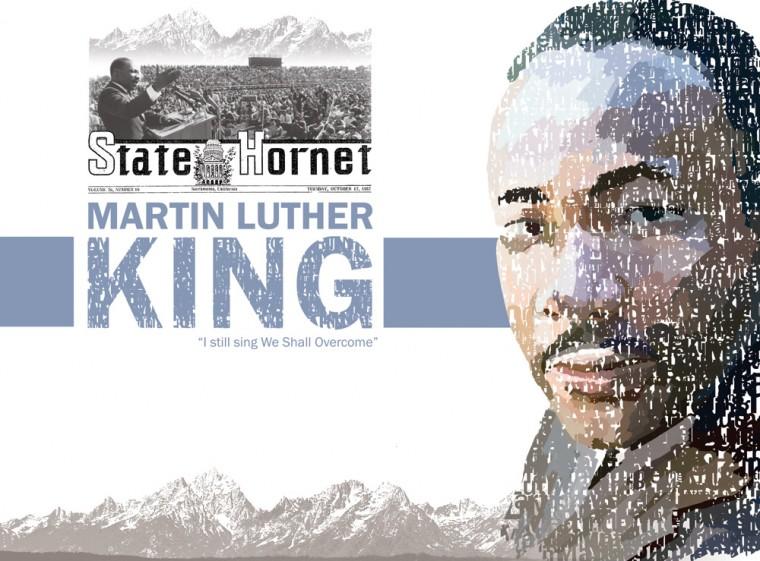“I still sing ‘We Shall Overcome”’
Martin Luther King Jr. spoke at Sacramento State in October 1967. The school will celebrate the 40th anniversary of his speech on Tuesday.:Martin Helms
October 16, 2007
Robert Hurley, a criminal justice professor at Sacramento State, was an undergraduate student when he attended the March on Washington in 1963 and saw Martin Luther King Jr. give his famous “I Have a Dream” speech on the steps of the Lincoln Memorial – an event that changed his perspective on life.
“That was very much for me, a defining moment,” Hurley said.
He said King was a dynamic speaker and made such an impression on him that once he was in graduate school, he chose to study King and figure out what motivated him.
“He had a great tilt to his voice,” Hurley said. “It was just unbelievable.”
Hurley’s recollection will not be the only one on Oct. 16, when Sac State celebrates the 40th anniversary of King’s speech on campus.
In 1967, King was on a tour of California and received a letter from Sac State’s Cultural Programs Committee asking him to stop on campus and speak to the students and faculty, according to a university press release.
The purpose of his visit was to address the concerns of more than 7,000 faculty members, students and community supporters who had questions about the future of the civil rights movement. Of particular interest was his speech “Beyond Vietnam” which was a reflection upon how far society had come in regards to racial relations and how far it still had to go.
“(Beyond Vietnam) is the speech that put him on our trajectory,” Kim Harrington, co-chairperson of the MLK committee, said. “These folks were trying to get an idea of what was going on…they were involved in their mission of education.”
The anniversary celebration will take place all day in the University Union and will include panel discussions and speeches by Clayborne Carson of Stanford’s Martin Luther King Jr., Research and Education Institute, and Juan Williams from National Public Radio. They will lecture about King’s ideas presented in the “Beyond Vietnam” speech, as well as the progress that has been made in the past 40 years since his visit.
“We’re moving beyond diversity to inclusion,” Harrington said. “Then it was black and white – now it’s in Technicolor.”
Later in the evening, Sacramento Black Art of Dance will perform and the multi-cultural gospel group, Sacramento Metropolitan Community Choir and MLKJ Mass Choir, will sing.
In addition, former state Sen. Mervyn Dymally, who now serves as the chair of the legislative black caucus, will give the same introduction he gave in 1967.
A short film of King’s address will be shown and recordings of his speech will be played throughout the day, courtesy of Sacramento Archives and Museum Collection Center.
Harrington said her hope is that students leave with an understanding of “the parallels of the time as well as the striking differences” between the America of then and the America of now.
On Oct. 10, 1967, just six days before King visited Sac State, his speech was moved from the gymnasium to the stadium to accommodate more people, according to a press release. After the administration of the time refused to pay for a temporary loudspeaker system, Jan Eakes, the president of Associated Students of Sacramento State College, paid for it out of pocket.
Harrington said the campus community should realize the student body of Sac State, which was the only California State University King spoke at, made it a priority to discuss controversial social issues of the time.
“We need to stop for a moment, be reminded of that, and be proud,” Harrington said.
Ashley Brown, a recent recreation and leisure studies graduate, said the King celebration sounds interesting.
“I just think that (civil rights have) come a long ways, but there’s still work to be done,” Brown said.
She said that although discrimination isn’t as widespread as it was in the past, it still exists.
Nancy LeRoy, a history and humanities and religious studies professor, said students should not only remember King, but all the other people who have fought for what he believed in.
“King was one man who represents the effort of millions,” she said. “We still miss him, but he also lives within us – especially when we stand up for human rights and civil rights.”
Although King defined racial division as a problem in America, Hurley said he was also concerned with the chasm between the rich and the poor. He didn’t focus on making things better for blacks, but rather on making things equal for everyone.
“He could have had many kinds of assignments or jobs but he took this one,” Hurley said. “He brought to the civil rights movement a very unique stamp.”
Natalye Childress Smith can be reached at [email protected].





























































































































